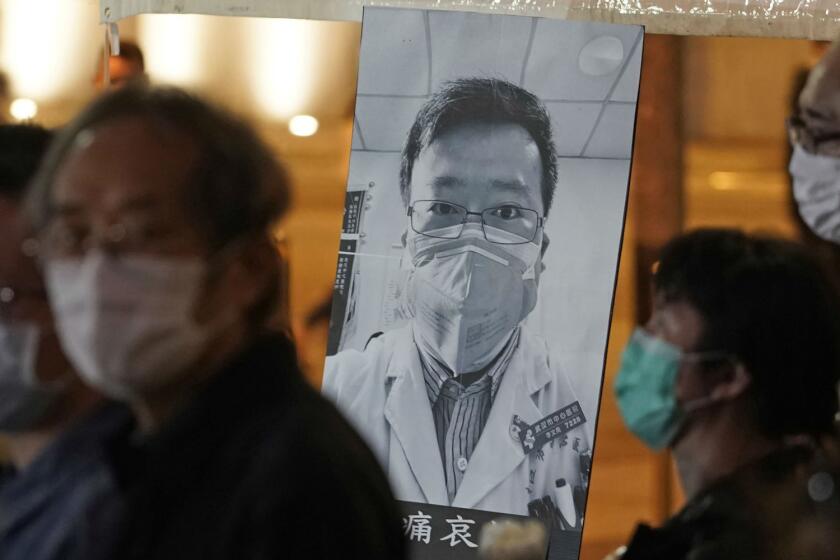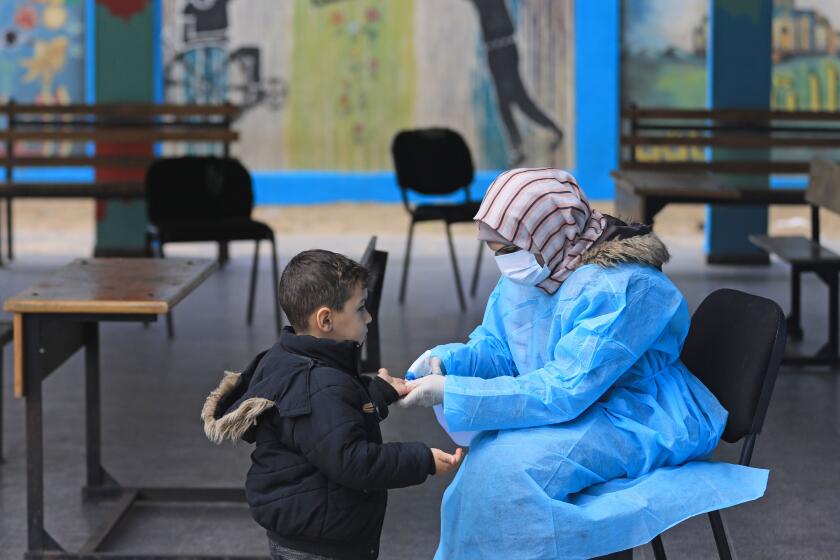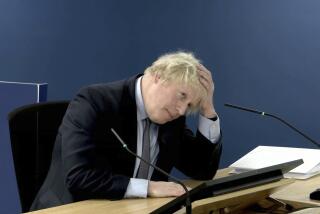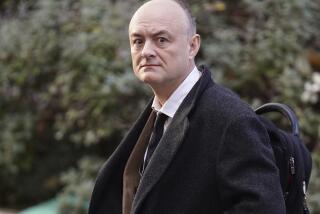On coronavirus containment, Britain’s Johnson is less restrictive than other European leaders
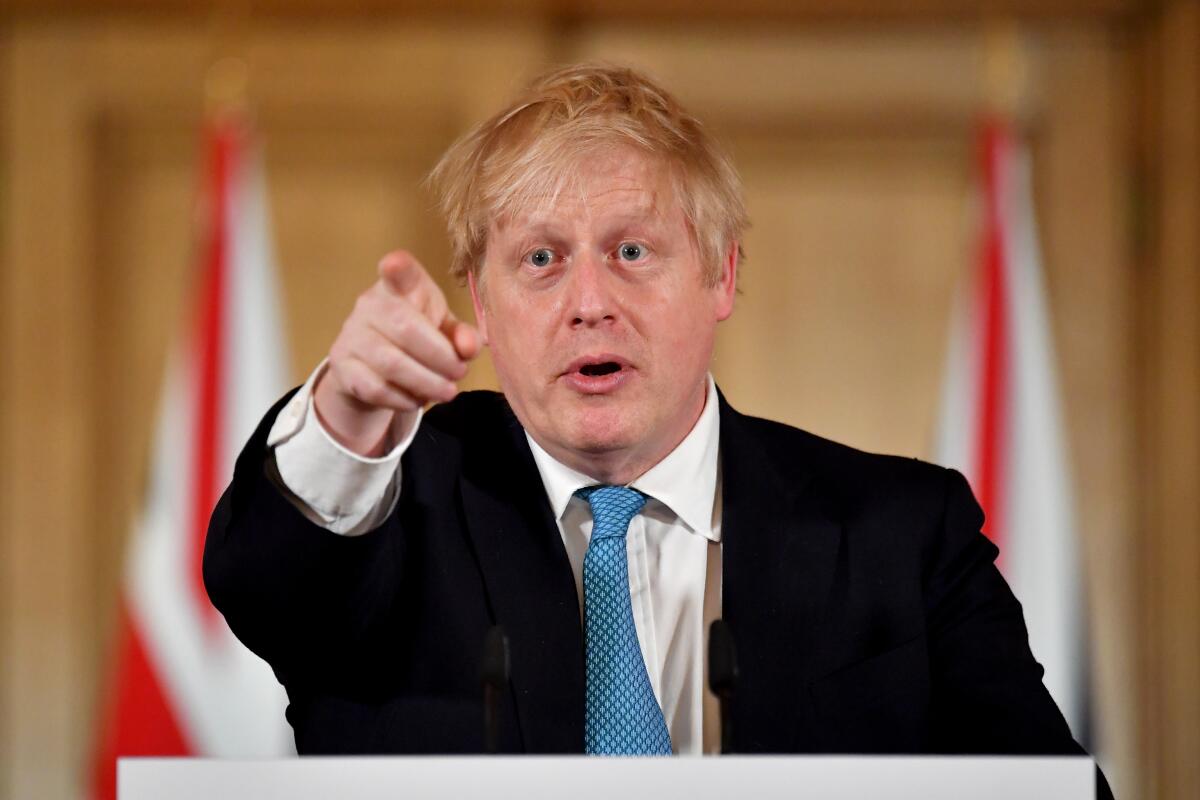
- Share via
LONDON — Londoners kept calm and carried on through the blitz, when Nazi warplanes hammered the British capital. Through the centuries, they weathered catastrophic fires, killing smog and modern-day terror strikes.
But when it comes to coronavirus, the spirit of pulling together for the greater good is being sorely tested, as Prime Minister Boris Johnson’s containment strategy has left his government something of an outlier among European nations.
The latest updates from our reporters in California and around the world
While the streets of capitals like Paris and Rome are virtually deserted amid strict lockdowns, Johnson’s government has so far been unwilling to impose such drastic restrictions either on London — an economic engine for not only the United Kingdom, but the world — or on the country as a whole.
So far, Johnson has urged people to avoid large gatherings, but has not banned them. Pubs and restaurants remained open, and as the week went on, many people mingled with seemingly little regard for the rules of social distancing.
For the first time in Britain’s modern history, all its schools are closing, but the order does not take effect until after classes finish Friday. Parents worried, but many felt they lacked options, as companies have not been formally ordered to let everyone possible work at home.
“It didn’t really feel right dropping off my daughter today, but with the schools still open, work continues on as usual,” Louise Russell, the mother of a 3-year-old in day care in London, said Wednesday. “I’m glad the kids have some normality, but recognize that it’s not great for those that are at risk.”
The reluctance to shutter schools sooner stemmed in part from worries that front-line healthcare workers might skip shifts without childcare in place, or be forced to leave their children with elderly parents who are most at risk. Once schools shut, they will provide day care for children of essential workers.
On Thursday, the national sense of urgency seemed to heighten. Transport officials in London announced the indefinite closures of dozens of stations on the city’s iconic subway system, known as the Tube, calling on people to take only essential trips.
“People should not be traveling, by any means, unless they really, really have to,” said London Mayor Sadiq Khan.
Queen Elizabeth II left town, departing Buckingham Palace ahead of schedule for Windsor Castle, not far from the capital. Citing a “period of great concern and uncertainty,” the monarch praised scientists and first responders, and called on Britons to pull together.
“We all have a vitally important part to play,” she said in a statement.
The country’s coronavirus strategy came under harsh international scrutiny last week after the government’s chief science advisor, Patrick Vallance, suggested in multiple interviews that the country needed to “build up some kind of herd immunity” so more people are immune to the virus and transmission will reduce.
That was met with widespread condemnation by experts who warned that it could involve at least 60% of the population contracting coronavirus, with hundreds of thousands of resulting deaths and an overwhelmed health system. More than 200 scientists penned an open letter urging the government to rethink the approach, and the government quickly clarified that herd immunity was not its policy.
Johnson’s initial go-slow approach on containment was in some ways reminiscent of that of President Trump, who is often a political kindred spirit. The two leaders bonded over Brexit, Britain’s departure from the European Union that formally took effect at the end of January, with a transition period set to last the rest of this year.
Trump had a notable shift in tone this week on the outbreak, likening himself to a wartime president and declaring he had known all along that coronavirus would become a worldwide pandemic. At a news conference Wednesday, Johnson signaled that tougher measures likely lay ahead, even while seeming to bemoan their necessity.
“We live in a land of liberty, as you know, and it’s one of the great features of our lives we don’t tend to impose those sorts of restrictions on people in this country,” the prime minister said. Senior aides have spoken of fears that too-strict restrictions too early would cause people to become fatigued with full-on isolation just as it was really needed.
On Thursday, Johnson expressed optimism that Britain could “turn the tide” in the fight against the virus in the next 12 weeks.
London, a city of 9 million people, is home to about one-third of the country’s confirmed cases of COVID-19, the respiratory illness caused by the novel coronavirus. The overall U.K. death toll has surpassed 100.
Like the United States, Britain has lagged in testing. Its confirmed cases approached 3,000, but scientists have said the true number might be more like 50,000.
Through the long years of World War II and after, Britain rationed food. But amid the outbreak, it has been largely a free-for-all, as shoppers besiege supermarkets and strip the shelves of food staples and hygiene products like toilet paper. At least one major chain set fixed shopping hours for older people and vulnerable members of the community, and another imposed buying limits on individual items.
Like other countries, Britain sought to ease what is shaping up to be a devastating blow to the economy. The Bank of England, in its second coronavirus-spurred emergency cut, reduced interest rates to 0.1%.
With many uneasy about the relatively slow pace of official measures, some Britons began taking distancing measures on their own. Facebook and Instagram have been standing in for face-to-face encounters. Free online classes sprang up, encompassing such diverse activities as yoga and Pilates and evening story time sessions for children.
Neighbors slipped notes under one another’s doors, offering to help anyone in self-isolation, or chatting by phone.
In the absence of government orders, the organizers of some large public events like soccer matches, the annual Grand National horse race and the Glastonbury Festival made cancellation plans rather than waiting for government orders.
But even as deaths and infections mounted elsewhere, the sense of urgency had not broken through for many.
Paige Steel, 25, and expecting her first child at the end of May, said Monday her doctor had given her no particular advice on measures to avoid the virus. Her husband, David, was still going out daily to his office job because he could not telecommute.
The coronavirus outbreak has largely spared children, but two new medical reports document the first infant and first teenager to die of COVID-19.
“I’m in two minds about what to do,” she said of efforts to prevent the virus’ spread. “I have very much got the attitude of, ‘If it’s going to happen, it’s going to happen.’”
The couple did not know anyone who had become ill, and had not stockpiled any supplies except diapers, wondering if those might be hard to obtain.
Neil Ferguson, a professor of epidemiology from Imperial College London who has been involved in advising the government on its strategy, said in a BBC interview this week that “I overall think we got the timing about right” on isolation measures.
On Wednesday, though, that assessment took on personal overtones. Ferguson posted on Twitter that he had developed a persistent dry cough and fever, and was self-isolating.
Special correspondent Boyle reported from London. Times staff writer Laura King in Washington contributed to this report.
More to Read
Sign up for Essential California
The most important California stories and recommendations in your inbox every morning.
You may occasionally receive promotional content from the Los Angeles Times.
